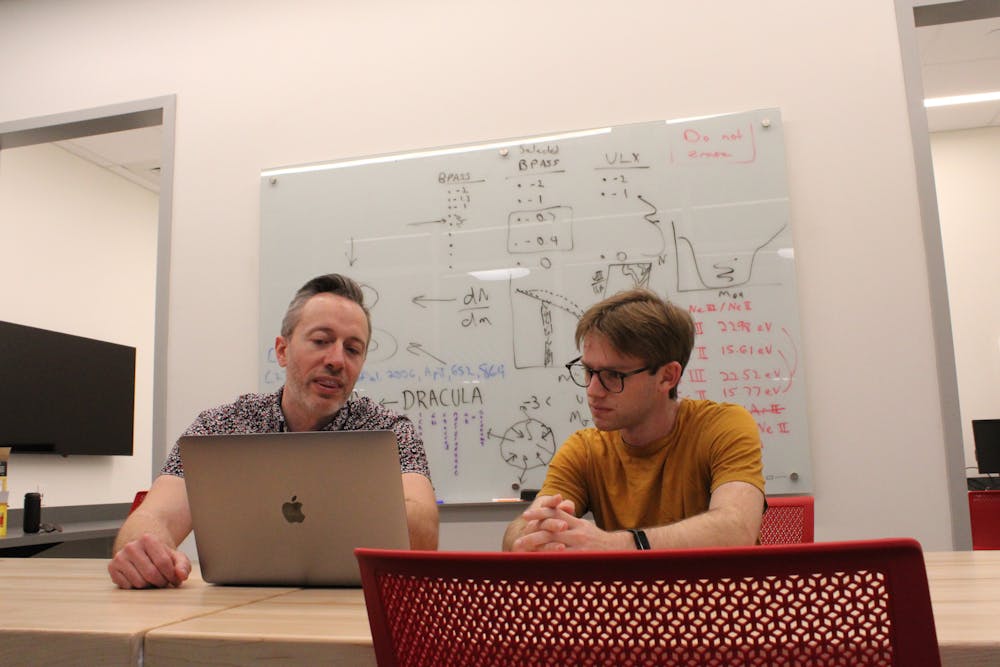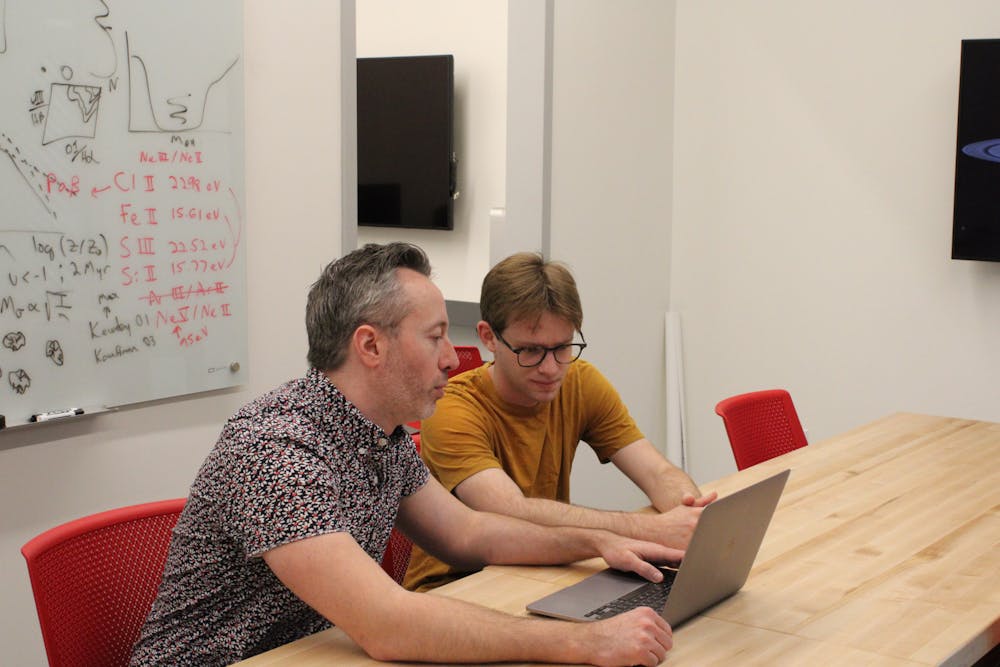Elon University senior Jordan Wels is uncovering the mysteries of black holes, fueled by a Lumen Prize scholarship and guided by his mentor: Elon professor of astrophysics Chris Richardson. Wels' research explores the evolution of these celestial objects and their potential impact on the Milky Way galaxy and beyond.
Wels said he never felt any "need" to pursue this research initially; however, he found resonance in the project after speaking to Richardson. As his understanding deepened, so did his enjoyment, fueling his continued dedication to the research endeavor.
“As I learned, I enjoyed it more. And that enjoyment has continued even still," Wels said. “The joy I get out of my research gives me the ability to keep doing this.”
Wels said Elon has played a crucial role in supporting his research. The Lumen Prize scholarship, for instance, is the most prestigious scholarship at Elon and rewards $20,000 for academic development.
“I arguably could have done this all without that money, but it has been used not just for physical resources — but conferences as well,” Wels said. “And those have made a tremendous difference in my time here.”
Wels said his background in computer science also proved vital. Coding, for example, had always been akin to solving a puzzle for Wels and engaging in research and coding amplified that sentiment — despite the hardships.
“There were so many setbacks relating to code and learning at the beginning of my research,” Wels said. “Astrophysics and the type of data analysis I was doing has a very steep learning curve, and so early on in my research, it was a struggle to get stuff done on time. I would run into endless errors, sometimes putting in 10 to 12 hours a week to get something done, but it almost always worked out.”
Wels described his research journey as emotionally intense, with highs and lows of success and anxiety. Despite the stress, Wels said he found the experience remarkably rewarding.
“The triumphs of something working out just right and looking fantastic, or not having a poster ready in time. The anxiety of presenting to an audience, or knowing that I might get to publish my work,” Wels said. “These were just a few of the things that have happened and each one brought their own emotion with them. My research has been constantly stressful, but more rewarding than I ever could have imagined.”
Looking back, Wels highlights the invaluable connections forged through his research — having met leading astrophysicists in his field.
“The people I have gotten to meet have to be probably the biggest highlight. I got to meet some of Dr. Richardson’s colleagues and even some relatively famous people in astrophysics,” Wels said. “It has been a pleasure working with the people that are going to be on the paper and it’s a truly invaluable experience.”

Photo Illustration: Elon professor of astrophysics Chris Richardson and Elon senior Jordan Wels work together to research black holes on March 8 in Innovation Hall. Wels received $20,000 through the Lumen Prize Scholarship to research the evolution of black holes.
Additionally, he said the support network provided by his research group has been invaluable. Wels' ultimate goal is to see his research published as a testament to his dedication and long hours.
“The work put into this research compared to anything else is impossible to describe. I have put so many hours into this that to see other people read it will bring me immense joy,” Wels said. “It taught me resilience and self-assurance more than anything else. I know that I can get through whatever challenges lie ahead and that there isn’t a reason to doubt what I know because I’ve now gotten this far.”
The research itself has yielded unexpected discoveries. Richardson said he and Wels found a new connection between how big a black hole can get and the kinds of elements found in the galaxy where the black hole is located.
“One of the biggest breakthroughs was when Jordan was working on a smaller project with a previous student in our group, and they derived a new relationship that relates black hole mass to its host galaxy’s elemental abundance,” Richardson said. “It was a moment that propelled his research into an exciting new direction.”
Richardson, coming off a year of sabbatical research, had an opportunity to mentor Wels based on a recommendation from Martin Kamela, chair of the Elon physics department. Richardson said this recommendation stemmed from Wels’ impressive performance in Physics I and II as a freshman.
“Jordan appreciates complex data sets that he can use the skills from his computer science background to analyze,” Richardson said. “I try to support his interests by encouraging him to dig deep into the data to find trends useful for his research.”
Richardson said one of the biggest challenges for all his students is scientific writing, an area he believes Elon's liberal arts foundation provides a strong advantage for. He said he tries to guide Wels through the Socratic method to further encourage him to discover solutions independently.
“About two-thirds of the research process is spent focusing on proposals or presentations, so calculations and visualization make up a surprisingly small portion of the research,” Richardson said. “I usually try to use the Socratic method to help Jordan find the answers to improving his writing rather than giving him the solution.”
Richardson also said the most rewarding part of being a mentor is witnessing students' enthusiasm for sharing their novel research findings, because this underscores the significant effort required to solve previously unsolved problems. Seeing the students' pride in their accomplishments is a rewarding culmination of their hard work.
“It takes much longer than any homework question to get a solution to a problem no one has solved before,” Richardson said. “It’s a huge moment of accomplishment and pride when you get to see, they get to see the fruits of their labor.”.
As for the research findings, Wels and Richardson said they found out that scientists have to think about different sizes of black holes when they look at the observable light from galaxies. If they don't, they might not understand how galaxies and black holes change over time.
“One of the more important results is that astrophysicists must account for variations in black hole mass when modeling the emission from galaxies containing active intermediate-mass black holes,” Richardson said. “Jordan’s results show that when this isn’t taken into account, it can lead to misleading results that skew our interpretation of galaxy-black hole evolution.”
Looking ahead, the mentor expressed aspirations for Wels’ future as he transitions into the workforce post-graduation this May. Richardson pledged ongoing support to assist Wels in navigating the challenges that lie ahead in his professional pursuits. In offering advice for Wels, Richardson stressed the importance of resilience in research and mentorship.
“Research is often a one-step backward and two-step forward process,” Richardson said. “Results rarely turn out the way we anticipate, but that should be a fun part of the process rather than a stumbling block. Sticking with the problem will ensure you’re successful in research over the long haul.”


